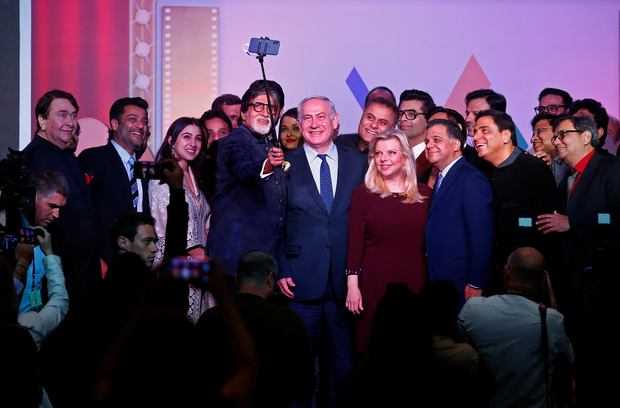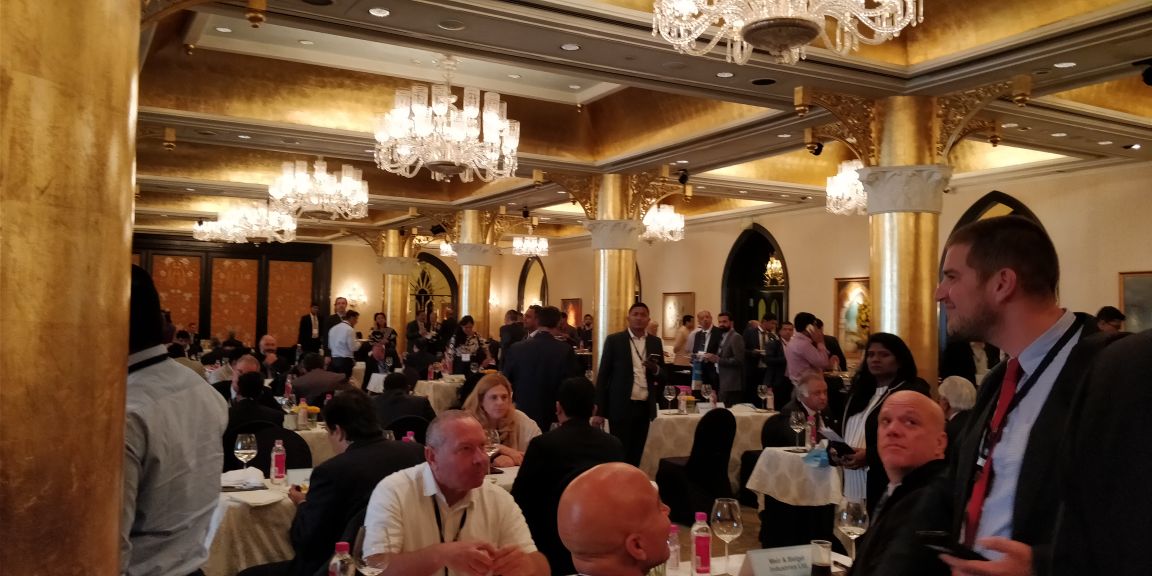Prime Minister Netanyahu’s visit to Mumbai had at least one concrete outcome: the signing of an MoU between the Maharashtra government and an Israeli government-owned company, Mekorot Development & Enterprise Ltd for a Rs 15,000-crore water grid project in Marathwada. This is the largest project undertaken by an Israeli company in India, the 10-year-long undertaking having all the makings of a successful partnership: it matches Israel’s advanced water technologies to the vast canvas of Marathwada district, an area three times the size of that country, and is aimed at making water abundantly available in a largely arid region.
Appropriately enough, water was an important theme of the visit, a gift in these parched, climate-changed times. Prime Minister Netanyahu came bearing for his friend and counterpart, Indian Prime Minister Narendra Modi, the very same dune-like buggy—a mobile desalination unit[1]—that they had ridden on Olga Beach (Haifa) during the Indian PM’s visit to Israel in July 2017. The two leaders raised their wine glasses of desalinated sea water—purified instantly by the machine in tow—and drank to the health of the India-Israel bilateral.
With this prototype[2] being gifted to India the message was even more precise: Israel’s innovative technologies were seeking Indian partners for execution and scaling up. In PM Netanyahu’s words, “It is a match made in heaven”.[3]
Ever since the two countries established full diplomatic relations in January 1992, it’s not their similarities as much as synergies built on their differences that have been propelling the bilateral forward. Both are democracies and protecting intellectual property rights is an important facet of these ties.
Israel is a very small (20,770 sq. km.)[4] nation of 8.34 million people[5], while India is territorially and geographically vast with a diverse population of 1.25 billion. Israel has ideas and innovative technologies[6] to offer at competitive prices—competitive when compared to military hardware from America, for example—while India gives Israeli companies and their Indian partners the opportunity, manpower, and market to scale up production. One has only to look at drip irrigation majors, NaanDan Jain Irrigation, which has an Israeli CEO, and Netafim, a wholly Israeli-owned company that now manufactures in India.
Correspondingly, this particular state visit adopted a more holistic business approach: the focus stayed deliberately away from defence sales (except for the attempt to revive a $500 million Spike tank missile deal). Of the 59 companies (most with multi-product and services portfolios), only nine had defence and homeland security among their offerings, and seven had cyber security.[7] This was a clear attempt to widen and deepen trade ties rather than an emphasis on selling military hardware to India.[8]
Israeli CEOs, who travelled in PM Netanyahu’s entourage, extended opportunities for tie-ups with Indian entrepreneurs in products and services, ranging from water purification and energy (solar), irrigation technologies, agricultural innovations, food processing, smart cities, infrastructure, telecom, automobiles, and cutting-edge medical diagnostic tools. There were also Israeli law firms and venture capitalists.

This was the first time that such large B2B meetings, such as the Mumbai conclave, had been organised,[9] but the foundations for these heightened engagements between Indian and Israeli entrepreneurs were laid in the early 1970s, when diplomatic relations were non-existent between the two countries—and not since 29 January 1992, when such relations were fully established.
Pre-1992 India-Israel trade
Early trade ties between the two countries began with the Israeli government’s sale of military hardware (guns) to India during the 1965 Indo-Pakistan War.[10] It was a covert purchase since the two countries had no diplomatic relations then.
The first breakthrough in economic ties occurred quite accidentally. In 1972, Dead Sea Works (DSW), which became part of Israel Chemicals Ltd (ICL) in 1975, a government-owned company that pioneered the extraction of minerals from the Dead Sea in the Negev Desert (in Israel’s south), increased its capacity for manufacturing bromine (used in pharmaceuticals, dyes, pigments, paints and allied chemicals) from 2,000-3,000 tonnes to 70,000 tonnes annually. This huge jump in capacity and output led the company to send its representatives abroad to assess potential markets. One of them came to India and met Narahari B. Handur-Kulkarni, well-known as a pioneer of India-Israel trade and the biggest bulk importer of chemicals in those days. “I used to indent (import) these products for the license holder,”[11] he recalls.
This meeting was the beginning of a decades-long business relationship between India and Israel through Kulkarni’s company, Technochem, and ICL, which absorbed Dead Sea Works, and is today a multinational conglomerate that trades on the New York Stock Exchange.
An interesting aspect of the import of bromine and its compounds from Israel was that it was mostly conducted through ‘switch’ business[12]. This meant that consignments from Israel, headed for India, came via a third country, and more pertinently in the early 1970s, via rupee payment, from Eastern Bloc countries, such as Romania, Bulgaria and Czechoslovakia. India then had a policy of issuing 67% rupee payment licenses—the remainder being in sterling payment—to conserve foreign exchange.
That this early trade quickly achieved scale and depth points to the potential of the India-Israel business profile even today. In 1972, DSW’s business from India was nil. In three years’ time, it was doing business worth $1 million. This had many positive fall-outs for businesses in both countries. It led to the creation in India of numerous small units, making bromine compounds, which are supplied to a wide range of manufacturing industries. It also resulted in the country’s self-sufficiency in a vital industrial and pharmaceutical raw material.

Next, more and more Israeli businessmen were emboldened to come to Kulkarni with business proposals, seeking Indian partners, once they saw DSW’s financial statements, says the entrepreneur.[13] Notable among them were, textile manufacturers from Israel who engaged with Mafatlal Industries, and Israel’s micro-irrigation specialist, Naan Dan, which collaborated with Jain Irrigation (it is today NaanDan Jain Irrigation Ltd). These early experiences of business collaboration between Indians and Israelis and together overcoming barriers, such as obtaining licenses, switch trading, and shipping via Sri Lanka and Singapore, were factors that built the foundations of trust in the business relationship.
A Free Trade Agreement (FTA) that is being negotiated currently and has the potential to spur an economic boom in both countries, may well turn out to be a superstructure on such a foundation. If it achieves fruition soon, given the window of opportunity apparent also in the special friendship between the two prime ministers, it has a good chance of having the biggest positive impact in the shortest possible time.
Sifra Lentin is Bombay History Fellow at Gateway House.
This article was exclusively written for Gateway House: Indian Council on Global Relations. You can read more exclusive content here.
For interview requests with the author, or for permission to republish, please contact outreach@gatewayhouse.in or 022 22023371.
© Copyright 2018 Gateway House: Indian Council on Global Relations. All rights reserved. Any unauthorized copying or reproduction is strictly prohibited.
References
[1] This mobile desalination unit (according to PM Netanyahu’s office soon after the Olga Beach walk and ride) is capable of providing 22,000 people drinking water per day.
[2] The name of the mobile desalination and purification unit is the Gal-Mobile. The unit was dedicated to the people of Suigam village in the border region with Pakistan, from where it will be able to give pure water to BSF soldiers guarding the borders and people of the surrounding villages.
[3] PM Netanyahu mentioned this in his keynote address at the India-Israel Business Summit 2018 held in Mumbai (18 January).
[4] CIA World Fact Book. This territory does not include areas occupied since the 1967 War. See: https://www.cia.gov/library/publications/the-world-factbook/geos/is.html.
However, according to the Israel Foreign Ministry website the nation is 22,145 sq. km in size. See: About Israel, Israeli Ministry of Foreign Affairs, THE LAND: Geography and Climate, http://www.mfa.gov.il/mfa/aboutisrael/land/pages/the%20land-%20geography%20and%20climate.aspx
[5] Accessed on 26 January 2018. https://www.livepopulation.com/country/israel.html
[6] Some relevant statistics given by the Chief Scientific Officer of Israel, Dr. Applebaum, at the India-Israel Business Summit 2018 (18 January, Mumbai) are: (1) Israel had 1400 start-ups in 2017, of which 600 start-ups succeeded (2) 4.3% of Israeli GDP is invested in R&D, and of this the lowest contribution is that of government as most of this investment comes from foreign private companies (3) 300 multi-national companies have their R&D facilities in Israel (4) The country has 65 bilateral international R&D Agreements.
[7] Israel Economic & Trade Mission, Business Delegation Accompanying H.E. Prime Minister Benjamin Netanyahu (17-18 January 2018), (Mumbai, Israel Trade Mission in India, 2018), pp 8-11.
[8] The total bilateral trade is $4.16 .billion between India and Israel, which does not include about $ 1 billion of defence sales (2016). The bilateral trade for 2017 is about the same as 2016 as mentioned at the India-Israel Business Summit in Mumbai (18 January, 2018). See Bilateral Trade Relations, Embassy of India, Israel, India-Israel Economic and Commercial Relations, http://www.indembassy.co.il/pages.php?id=14#.WmsWz6iWbIU (Accessed on 26 January 2018)
[9] Business to business meetings were also organised during Israeli President Reuven Rivlin’s visit to India in 2016.
[10] Shindler, Colin, eds., Israel and the World Powers: Diplomatic Alliances and International Relations beyond the Middle East (London, I.B. Taurus, 2014), p. 15.
Evans, Daniel, ‘India-Israel Bilateral Relation’, Journal of the International Relations and Affairs Group, Volume V, Issue 1, 19 June, 2015
[11]License Raj was a term used to describe the regulation of the private sector in India between 1947 and the early 1990s. During this period, as one needed the approval of numerous agencies in order to set up a business legally. Manufacturing particularly, was heavily regulated, as were imports. The Licence Raj was the result of a mixed economy that used a government planning commission established after India’s independence. India began to liberalize its economy in the 1980s, ending the Licence Raj.
[12] Switch business or trading in this specific context refers to sourcing imports from free-currency areas via countries termed as Rupee payment areas (the Soviet Union and other Eastern Bloc countries), whereby adjustments in trading accounts were made between the switch countries and the Free (Sterling) currency countries.
[13] Interview with NBH Kulkarni on 19 January 2018.